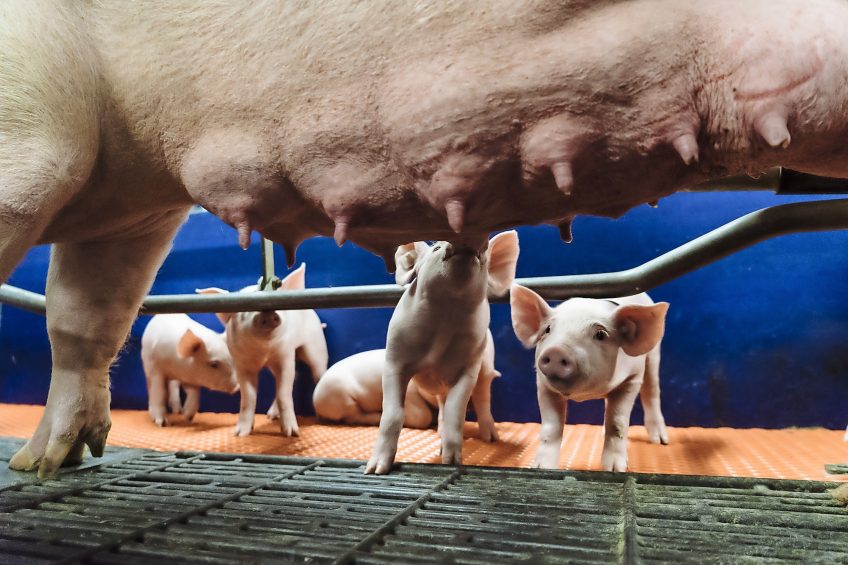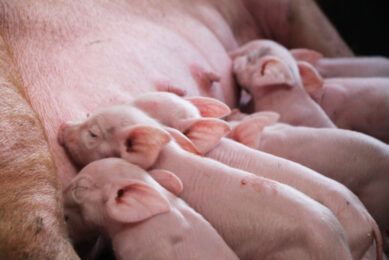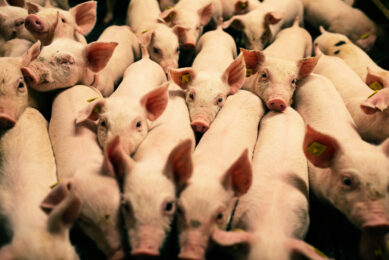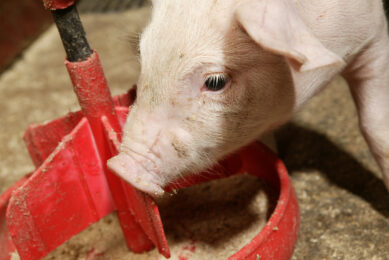Fewer pathogens with egg immunoglobulins

For newborn pigs there are often a host of different challenges – think of crushing or contamination of the farrowing pen. For the last problem, solutions exist. A dietary approach can help to relieve pathogenic pressure through sow manure.
The main objective of a piglet producer is to maximise the number of healthy weaned piglets per animal per year. Nowadays, it is not difficult to find production systems delivering more than 30 piglets weaned/sow/year. Combining strategies on management, feeding, and health of both piglets and sows, is crucial for increasing sow’s productivity.
A unique environment that can determine the success of a piglet farm is the farrowing unit. It is important to reduce as much as possible losses during this period. Pre-weaning mortality must always be monitored and targets must be set. In European conditions, it ranges between 8-10%.
One important driver in reducing pre-weaning mortality is understanding the fragility of newborn piglets. At birth, the resources of a piglet are very scarce: low energy reserves and practically no immune defence against existing pathogens in their new environment. Problems are prone to happen and will be mostly caused by pathogens present in the environment, in the feed, in the water and most important, in the faeces of the sow. The main contamination source for newborn piglets is their mother’s manure. And this first contamination can be quite severe causing diarrhoea and increasing piglet mortality.
Together with crushing, diarrhoea definitely causes a high percentage of total losses during the first days of life. In most of the cases, the disease is caused not only by one agent but by a combination of enteric infections from different pathogens or at least different strains of a pathogenic species. E. coli and clostridia are two of the most important diarrhoea causing pathogens during the first weeks after birth.
Pathogens during the first days
E. coli is well known as one of the main responsible pathogens for pre-weaning diarrhoea. And although it belongs to the normal intestinal flora of pigs, part of the different E. coli strains are pathogenic. E. coli cause about 80% of diarrhoeas in piglets and 50% of losses in piglet production. The factors making E. coli pathogenic, the so-called virulence factors include e.g. fimbria to attach to the intestinal wall and the capacity to produce toxins.
The Clostridium species are another important pathogen class. During the suckling phase, piglets are quite susceptible to Clostridium perfringens type C. This bacteria causes necrotic enteritis in piglets and the clinical symptoms appear during the first days of life. This disease provokes serious disturbances in the organism with a mortality up to 100%. It causes significant decrease in daily gain and in weaning weight.
Strategy to protect the piglets
In order to maximise the sow’s performance – measured in piglets weaned per year – it is crucial to provide the best possible conditions to the piglets. Therefore the reduction of the pathogenic pressure in the farrowing unit ranks first. Cleaning of the pen is a way to get rid of germs like E. coli and Clostridium species, the most important pathogens during the first days. This should be completed by an effective gut health management in sow and piglets. For this purpose natural ingredients can be used. Supplying natural and active immune cells, the so called antibodies, has been proven to be quite efficient in supporting gut health. Applied to piglets, immunoglobulins from the egg bind to pathogens within the intestinal tract. They show efficiency in supporting piglets’ performance, decreasing the incidence of diarrhoea, mortality and increasing daily gain.
The idea was to check if these immunoglobulins from the egg could also bind pathogens in the sow’s gut and generate harmless complexes. That way pathogenic pressure for the piglets could be reduced. Thus a trial was conducted in Japan to check this thesis.
Figure 1 – Amounts of total E. coli, O 141 E. coli and Clostridium perfringens in the faeces of sows 10 days before delivery (before the first application of an egg immunoglobulin supplement*) and 7 days after delivery (after the last application of this supplement*).

Trial
In the trial two groups contained eight sows each. The sows of the control group received standard lactation feed, the trial group was also fed standard feed with a supplement containing egg immunoglobulins (Globigen Sow, EW Nutrition, at a dosage of 5 g/sow twice daily) on top during the last ten days before and the first seven days after delivery. The faeces of the sows were obtained by rectal stimulation (in order to get no contamination from the environment) on day 10 before and day 7 after delivery. The amount of colony forming units (CFU) of total E. coli, E. coli O141 and Clostridium perfringens were determined.
Results are shown in Figure 1. At the beginning of the trial, before the application of the immunoglobulin supplement, both groups showed nearly the same level of the evaluated pathogens with a slight disadvantage for the supplement group. After 17 days of applying the product based on egg immunoglobulins, a reduction of the colony forming units of total E. coli, E. coli O141 and of Clostridium perfringens could be seen. The sows of the supplement-fed group showed a lower level of pathogens in their excrements than the sows of the control group.
Conclusion
It is important for swine producers to understand what adversely influences the results on the farm. One consideration is to improve farrowing unit conditions of the piglets, aiming to reduce pre-weaning mortality. The results of the trial showed that a supplement based on egg immunoglobulins supplied on top of standard sow diets substantially reduced the amount of pathogenic colonies in sow manure. The reduction on pathogenic pressure and therefore the incidence of diarrhoea may be an alternative for increasing the profitability of piglet producers by increasing the number of healthier piglets weaned/sow/year.
References available on request.











